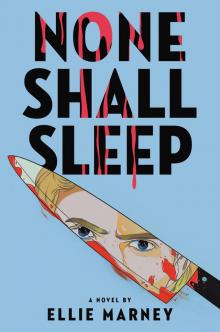- Home
- Ellie Marney
None Shall Sleep
None Shall Sleep Read online
Copyright
This book is a work of fiction. Names, characters, places, and incidents are the product of the author’s imagination or are used fictitiously. Any resemblance to actual events, locales, or persons, living or dead, is coincidental.
Copyright © 2020 by Ellie Marney
Cover art copyright © 2020 by Janelle Barone. Cover design by Karina Granda.
Cover copyright © 2020 by Hachette Book Group, Inc.
Hachette Book Group supports the right to free expression and the value of copyright. The purpose of copyright is to encourage writers and artists to produce the creative works that enrich our culture.
The scanning, uploading, and distribution of this book without permission is a theft of the author’s intellectual property. If you would like permission to use material from the book (other than for review purposes), please contact [email protected]. Thank you for your support of the author’s rights.
Little, Brown and Company
Hachette Book Group
1290 Avenue of the Americas, New York, NY 10104
Visit us at LBYR.com
First Edition: September 2020
Little, Brown and Company is a division of Hachette Book Group, Inc. The Little, Brown name and logo are trademarks of Hachette Book Group, Inc.
The publisher is not responsible for websites (or their content) that are not owned by the publisher.
Library of Congress Cataloging-in-Publication Data
Names: Marney, Ellie, author.
Title: None shall sleep / Ellie Marney.
Description: First edition. | New York : Little, Brown and Company, 2020. | Audience: Ages 14+. | Summary: Eighteen-year-olds Emma Lewis and Travis Bell, recruited by the FBI to interview juvenile serial killers, must turn to a notorious teenage sociopath to help track down a new murderer.
Identifiers: LCCN 2019056594 | ISBN 9780316497831 (hardcover) | ISBN 9780316497800 (ebook) | ISBN 9780316497824 (ebook other)
Subjects: CYAC: Serial murderers—Fiction. | United States. Federal Bureau of Investigation—Fiction. | Criminal investigation—Fiction.
Classification: LCC PZ7.M34593 Non 2020 | DDC [Fic]—dc23
LC record available at https://lccn.loc.gov/2019056594
ISBNs: 978-0-316-49783-1 (hardcover), 978-0-316-49780-0 (ebook)
E3-20200724-JV-NF-ORI
Contents
COVER
TITLE PAGE
COPYRIGHT
DEDICATION
EPIGRAPH
CHAPTER ONE
CHAPTER TWO
CHAPTER THREE
CHAPTER FOUR
CHAPTER FIVE
CHAPTER SIX
CHAPTER SEVEN
CHAPTER EIGHT
CHAPTER NINE
CHAPTER TEN
CHAPTER ELEVEN
CHAPTER TWELVE
CHAPTER THIRTEEN
CHAPTER FOURTEEN
CHAPTER FIFTEEN
CHAPTER SIXTEEN
CHAPTER SEVENTEEN
CHAPTER EIGHTEEN
CHAPTER NINETEEN
CHAPTER TWENTY
CHAPTER TWENTY-ONE
CHAPTER TWENTY-TWO
CHAPTER TWENTY-THREE
CHAPTER TWENTY-FOUR
CHAPTER TWENTY-FIVE
CHAPTER TWENTY-SIX
CHAPTER TWENTY-SEVEN
CHAPTER TWENTY-EIGHT
CHAPTER TWENTY-NINE
CHAPTER THIRTY
CHAPTER THIRTY-ONE
CHAPTER THIRTY-TWO
CHAPTER THIRTY-THREE
CHAPTER THIRTY-FOUR
CHAPTER THIRTY-FIVE
CHAPTER THIRTY-SIX
CHAPTER THIRTY-SEVEN
CHAPTER THIRTY-EIGHT
CHAPTER THIRTY-NINE
CHAPTER FORTY
CHAPTER FORTY-ONE
CHAPTER FORTY-TWO
CHAPTER FORTY-THREE
CHAPTER FORTY-FOUR
CHAPTER FORTY-FIVE
AUTHOR’S NOTE
ACKNOWLEDGMENTS
DISCOVER MORE
ABOUT THE AUTHOR
For all the scared, stubborn, angry girls
Explore book giveaways, sneak peeks, deals, and more.
Tap here to learn more.
I think of the journey
we will take together
in the oarless boat
across the shoreless river.
Ursula K. Le Guin, “Travelers”
CHAPTER ONE
Edmund Cooper, federal agent, stands at the edge of the training field and looks up. There is flashing movement between the trees in the forested area beside the athletics oval. Ohio State University maintains an obstacle path in the woods there, and students sometimes run drills. Two students emerge from the tree line now. Cooper watches one of them carefully.
She’s a very slight figure, her smallness exaggerated by a baggy gray OSU sweatshirt and black training pants cut off at the knees. She looks healthy. That’s positive. In the photos from two and a half years ago she looked like a wreck. Now her cheeks are ruddy from exertion, her focus keen. She runs hard, though, the armpits of her sweatshirt stained dark. Her skin is white, but her legs are very tan.
And she’s buzzed her hair. It’s a regulation-style Number One, like you’d get in the corps, or in jail. Cooper tries not to read too much into that. He doesn’t really know this girl, except for what he’s seen in the file.
He waits by the edge of the oval as Emma splits from her running partner and talks with the coach. Patience is one of Cooper’s particular talents.
She’s heading for the locker rooms when he calls out. “Emma Lewis? Miss Lewis?”
It’s there in her body language: that jerk, the instant of animal tension. The flat assessment in her eyes, even once she realizes he’s wearing a suit, holding up credentials.
He stays exactly where he is. “Miss Lewis, my name is Edmund Cooper. I work for the government. I’d like to speak with you, if I may. Somewhere public, if that is your preference.”
It’s okay if he sounds rehearsed. Formal and polite is fine. Emma waits a few beats, then takes the business card he’s holding out. Cooper is reminded of feeding deer off the back of his mother’s porch in New England.
“You work for the government?” She’s still perspiring after the run, but her breathing is already back under control. She glances at the card, at him. “You’re a federal agent, this says.”
“That’s correct. I work for the Federal Bureau of Investigation.”
She makes a single styptic blink. “I don’t have any more information about the Huxton case. I’ve told the police everything I know—”
“No, no,” he says. “Miss Lewis, this meeting is not in regard to that case. This is unrelated. Can we perhaps sit down somewhere to talk?”
Hesitation before she relents. “Sure. Uh—here is fine, I guess.”
She directs him to a picnic table in a grassy open area beside the equipment shed. Nice and public, but with enough distance for privacy. It’s sunny, though. He’s sweating a little in his jacket.
Emma has a towel draped around her neck and a canteen on the table to her right. The dark stubble on her scalp is like a fine down. It suits her, actually. She looks compact, contained. Fierce. Cooper makes sure to sit across from her at the table, give her space.
“Thank you for speaking with me. It’s nice to meet you.”
She doesn’t respond to that. “Did you fly from Virginia?”
“No, I drove.”
“That’s a long drive.”
“Yes, it is. You study psychology here at OSU, is that right? Hoping to specialize in pediatric psychology? Your professor said you were inspired by a positive experience with an excellent therapist—”
“Yes.” She tilts her head, lets the sun fall on her face. “Mr. Cooper, why have you come to see me?”
Time to plunge in. “Miss Lewis, have you heard of the Behavioral Science section of the FBI?”
“Yes.” Her gaze is direct. “They do psychological assessments—profiles. They did a profile on Huxton.”
“We help in cases like that, yes. Violent crimes. Behavioral Science is a young area—we’ve been working active cases for less than a decade. But we seem to be one of the sections producing results.”
“You catch killers.”
She’s quick. He knew she was quick. “We look at the evidence and the information we have and try to figure out a pattern of behavior. Once we have a pattern, it allows us to narrow down suspects, even predict what a perpetrator might do next. It helps us find them faster.”
“Okay.”
He understands the change in her expression straightaway.
“It’s not one-hundred-percent accurate, Miss Lewis. Nothing is. We just do our best. But our success rate is generally high.” Not with Huxton. Huxton was a mess. Cooper buckles that shit down. It’s not helpful here. “The reason we’re successful is because we do our homework. We go into jails and institutions and interview the perpetrators we incarcerate. It’s a lot like a research project. The information we gather is compiled in a database and used to inform our profiling work.”
“Great.” Emma’s posture is very stiff.
There are times Cooper wishes he still smoked. He could light a cigarette, look more normal, relaxed. If you seem to relax, it relaxes the subject.
“Miss Lewis, we’ve interviewed about thirty-five incarcerated perpetrators from all over the country. But there’s a cohort of people we still don’t have access to. And it’s not because we can’t see them. They just… won’t speak to us.” He’s been looking at her, but now he really looks. “I’m talking about juvenile offenders.”
The OSU Buckeyes cheer squad is rehearsing on the other side of the oval. Cooper hears the rallying calls as a far-off stir of echoes.
“Juvenile killers.” Emma rolls the syllables in her mouth. Then she reaches for the canteen and takes a swig, like she’s washing away the taste. “There can’t be many teenage serial killers, though.”
“There’s enough.” He doesn’t want to come in hard, but he’s getting the feeling she responds better to that. “Everyone starts somewhere.”
“Like it’s a career.” She looks toward the oval.
“Bundy started at fourteen.”
She stares at him. She looks very young. He resists the instinct to be gentle. They need this. Her, or someone like her. There aren’t many people like her.
“Miss Lewis, we think the reason these teenage offenders won’t talk to us is because they distrust authority figures, including our interviewers. And this is why I’ve come to speak with you. We need someone to—”
“No.” She shifts, ready to rise.
“Five inmates. Five interviews, total.”
“Ha. Still no.”
“You would have support. A partner. A unit. It would be entirely safe—”
“Is that what you think?” She stands. “Mr. Cooper, you’ve come a long way, but you’re asking the wrong person.”
“I don’t believe I am. And I’d like you to think about what I’m offering.”
Her jaw locks and she breathes out her nose. “Okay. What are you offering?”
He keeps his voice even. “The chance to come in on a kind of scholarship. You’d defer your summer classes and come live on base with us over the break. You’d be paid as a candidate and given some bureau instructional training. If forensic psychology is something you decide to pursue, you could enter our program. Your education after your freshman year would be subsidized. Or if not, you could return here to complete any further units in pediatric psychology.”
“That…” She sinks back down. “That sounds very generous. I suppose I don’t need to ask why me.”
“Mostly, it’s because you’re the right age. But you’re also studying in a field of undergraduates we’re already interested in. You have the academic background, you’re top of your class—”
“And I have first-hand experience of the subject.”
“That is only one of a number of considerations.” For the first time, he leans forward. “We’re looking for a certain mindset, Miss Lewis. These interviews… Every piece of information we gather helps us. And every time our knowledge increases, we get faster. Save more lives.”
The “saving lives” line was heavy-handed. He still thinks that’s how he’ll win her.
She narrows her eyes. “I’ve spent two and a half years trying to get out of that mindset, Mr. Cooper.”
“Do you think you’ve succeeded?”
Her expression doesn’t change, but he sees it again: that flare of animal panic in her face. But it is sometimes his job to do hateful, necessary things.
She looks away from him, looks around at the grass, at the trees and buildings. Then she gets to her feet, slowly this time, as if the conversation has aged her. “Mr. Cooper, I appreciate what you’re doing. But I don’t think I can help you. I hope you have a safe drive home.”
“You’re driving home yourself, is that right? Back to Apple Creek?” He rises to match her. “Would you please think about what we’ve discussed over the weekend?”
“I’ll think about it.” She retrieves her canteen.
“You have my card, if you need to call. Thank you for your time.”
“Goodbye, Mr. Cooper.”
He watches her walk away, dark head bobbing, sun glaring off the white of her running shoes. They’re good-quality shoes.
His pager beeps at him. He walks back up the rise, to the bus stop area above the oval, where there’s a pay phone, and calls collect. “Cooper.”
FBI section chief Donald Raymond sounds pissed even at a distance. “I call down to your office, they tell me you’re in Columbus. What the fuck are you doing in Ohio, Ed?”
Cooper’s habit is to always respond to Raymond with calm. “Don, we talked about this.”
“I thought you were kidding. You’re not kidding? You seriously want to send an eighteen-year-old girl into maximum security prisons to interview serial murderers?”
“She won’t be going in alone.”
“Oh, right, sure. She’ll be going in with your other candidate, what’s-his-name… Travis Bell, who’s—” There’s the sound of Raymond flicking through file notes. “Who’s not even old enough to buy a beer. That’s great, Ed.”
“Don, we tried sending agent interviewers in to see these prisoners. You could hear crickets three states away. If we send in teenage interviewers, at least we’ll have tried something different. And these aren’t green kids, remember. They’re veterans.”
“This Lewis girl,” Raymond says. “She survived the Huxton thing, right? How many did Huxton do? Nine?”
“Nine,” Cooper confirms.
“So number ten got lucky.”
Through the plexiglass of the phone booth, Cooper tracks Emma’s retreating figure. “It had nothing to do with luck. She didn’t get rescued. She fought. Escaped.”
“Okay, so she’s a soldier. Same as this Travis Bell. He’s Barton Bell’s kid? From the Gutmunsson case? Jesus.”
“Yes.” Cooper pauses, so they can both give the Gutmunsson incident the moment of somber contemplation it deserves. “Bell went into USMS training soon as they let him. Takes after his dad, the instructors are saying.”
“Good for him.” Raymond pauses. “This is gonna be a tough gig, Ed. You really want to send these kids back into the nightmare?”
Raymond is not known in the bureau for his insight. This is the first insightful thing he’s said since the conversation started and Cooper runs with it, speaks now with the terrible authority of battlefields served. “After a thing like that, Don, I don’t think the nightmare ever lets you go. You just get better at dealing with it. These two are dea
ling with it. Let’s give them a chance to help.”
Raymond huffs. “All right, then. You want to give it a try, you let it run. But listen to me, Ed. This is a one-time pass. They come in, they do the work, claim their per diem, go home. I find out they’ve overstepped, or I hear one single whisper about this in the press, and I’ll pull the plug so fast you’ll hit your chin on the drain hole going down. Are we perfectly clear?”
“Sir, yessir.” Cooper finds himself slipping into his old Marine disciplines when something sticks in his craw.
“Now, any updates on Pennsylvania? Carter said there were two bodies this time.”
“That’s correct. I’m still waiting on forensics—I’ll give you a full report when I return to base.”
“All right, keep me in the loop. Goddammit, these monsters just keep multiplying like the fucking Hydra.” The sound of Raymond’s pen clicking. “Did the Lewis girl even agree to come on board?”
“She’s getting back to me.” Cooper can’t be sure Lewis will accept, or that she’ll be capable of doing what he needs her to do. She’s just a kid. But he remembers the way she looked around at the university buildings and the training fields, like she was memorizing them. He thinks she’ll bite.
“I get Bell,” Raymond is saying. “Bell makes sense. But I don’t know about this girl.”
Cooper is aware that whatever he says right now, he has to believe it.
“Emma Lewis has experience with these types of offenders. She understands the way they think and behave. She’s not fooled by them—she knows what they are.” He thinks of Emma’s dark-stained sweatshirt, her twitchy reactions. Her bright, fierce eye. “We can’t be sure until she settles in. But I think she’ll do just fine.”
CHAPTER TWO
In the lonely hours of the morning, Emma jerks awake in the dark, gasping.
It takes her a few moments to remember where she is, to get the outlines of her body solid. She’s all right. She’s home. Her T-shirt is damp. She’s safe. Breathe.
She lies there with her eyes open, listening to the sound of katydids outside. She hasn’t had a bad dream in months. This dream was not Cooper’s fault, although it’s hard not to feel resentful. Emma allows herself to clutch the resentment tight for the space of a few heartbeats, then deliberately releases. It’s okay to acknowledge the emotions, but that sort of thinking is not useful to her.

 None Shall Sleep
None Shall Sleep All Aces
All Aces All Fall Down
All Fall Down